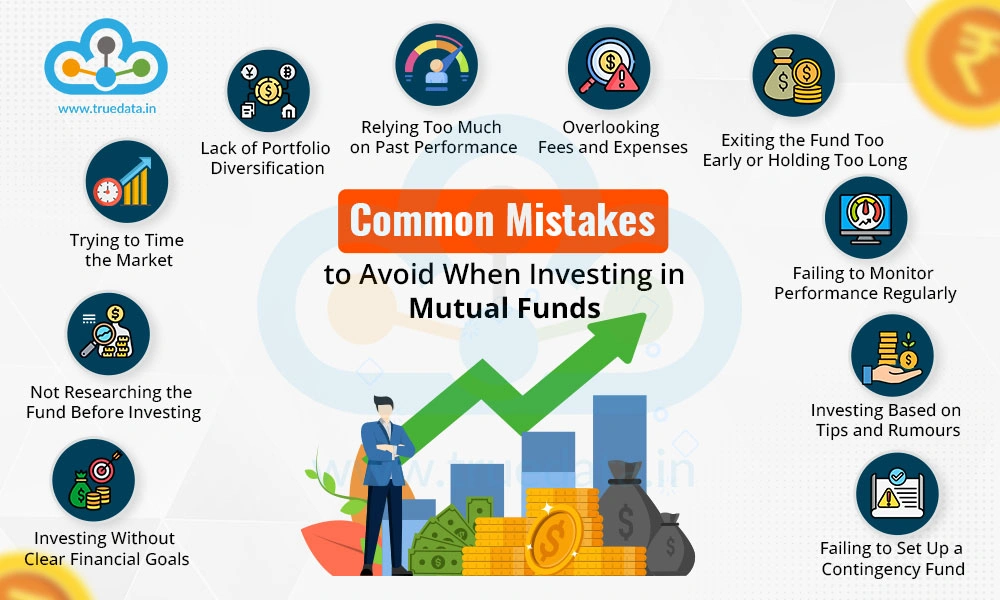
Stock markets worldwide have been under pressure for years now following a series of events like COVID-19, the Russian-Ukraine war, unrest in the Middle East, and more. The Indian stock market, too, is not free from this onslaught and is seeing some correction. While most conservative investors will try to cut their losses, seasoned investors and investors with a long-term view see this as a buying opportunity utilising this as an excellent time to invest in quality stocks or mutual funds. However, investing without a clear vision can lead to many mistakes and may not yield the desired returns from the portfolio. So what are these mistakes that you need to avoid? Here is a list of the top mistakes to avoid while investing in mutual funds enabling investors to make sound investment decisions.

Investing without clear financial planning or a goal is a topmost mistake often made by novice investors. Whether the aim is saving for retirement, a child’s education, or buying a house, it is crucial to link mutual fund investments to specific goals. Equity funds, for instance, are suitable for long-term goals, while debt funds work better for short-term goals. Investors should know their timeline and desired returns so that they can choose funds that are appropriate for their specific objectives.

Another important mistake investors make is jumping into a mutual fund without understanding it correctly. Mutual funds come in various types, such as equity funds, debt funds, and hybrid funds, each with different levels of risk and returns. If someone invests without knowing the fund’s goals and underlying assets, they might end up with something that does not fit their financial needs. Before investing, it is important to thoroughly research the fund, read its prospectus, and ensure it aligns with the investor’s financial goals and risk tolerance.

Attempting to buy and sell mutual funds based on short-term market trends is a common mistake many investors make. The ability to time the market is quite difficult, even for professionals, and can lead to losses. Therefore, investors should focus on disciplined investing, like through Systematic Investment Plans (SIPs), which allow them to invest regularly regardless of market fluctuations. This helps reduce the risk of making bad decisions based on emotions and ensures consistent investments over time.
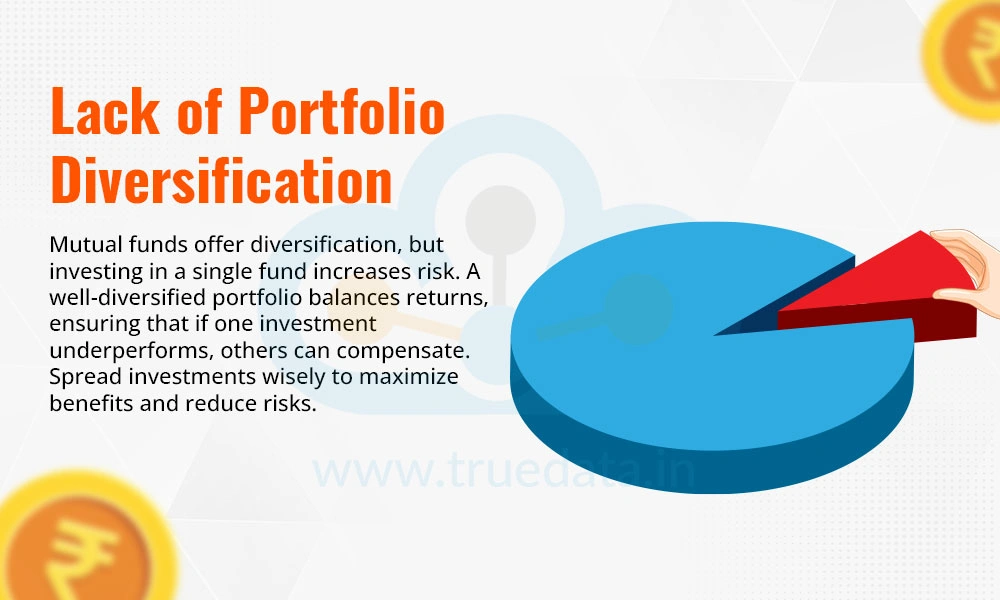
Diversification is the biggest benefit of investing in mutual funds, however, many investors make the mistake of putting all their money into a single mutual fund or similar types of fund. This approach increases investment risk and does not provide the desired benefit of diversification and portfolio returns. A diversified portfolio ensures that even if one investment does not perform well, others may still deliver good returns.
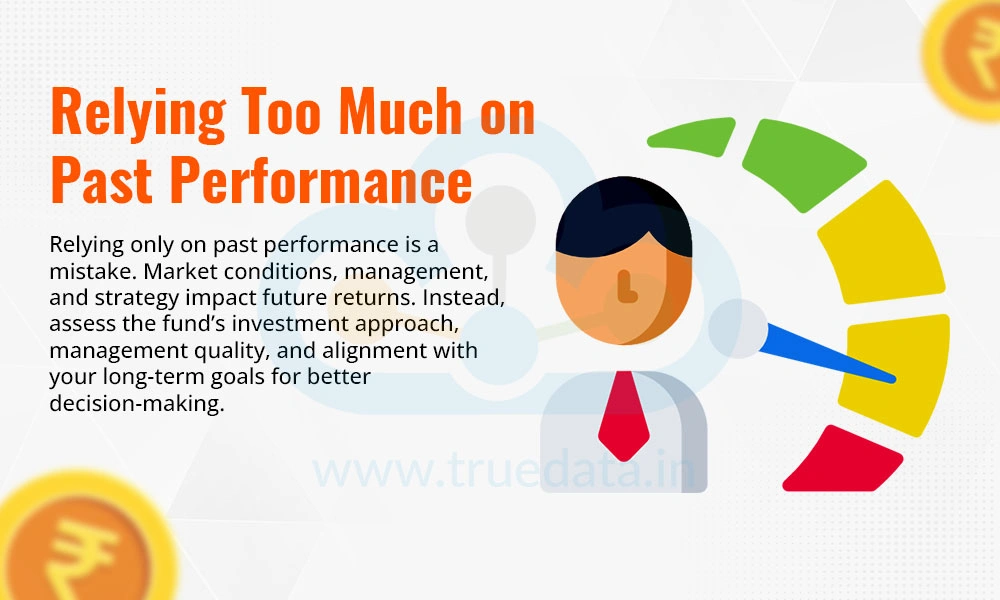
A common mistake is choosing mutual funds solely based on past performance. While a good track record is important, it does not guarantee future success. Multiple factors (like changing market conditions, company performance, or new management) can affect a fund’s future performance. Investors should, therefore, look beyond past returns and focus on the fund’s investment strategy, fund management, and its fit with their long-term financial goals.

Every mutual fund charges fees, called the expense ratio, to cover the cost of managing the fund. These charges vary based on the terms and conditions of the AMC (Asset Management Company) subject to the ceiling limits laid down by SEBI. A few funds may charge higher fees and a common mistake is to ignore the small difference in expense ratio percentage as it can add up to a huge quantum being deducted from portfolio returns over time. Lower expense ratios can significantly impact long-term returns, especially when investing large sums or over a long period. Therefore, it is essential to compare fees when choosing a mutual fund and opt for those with lower expense ratios for better returns.
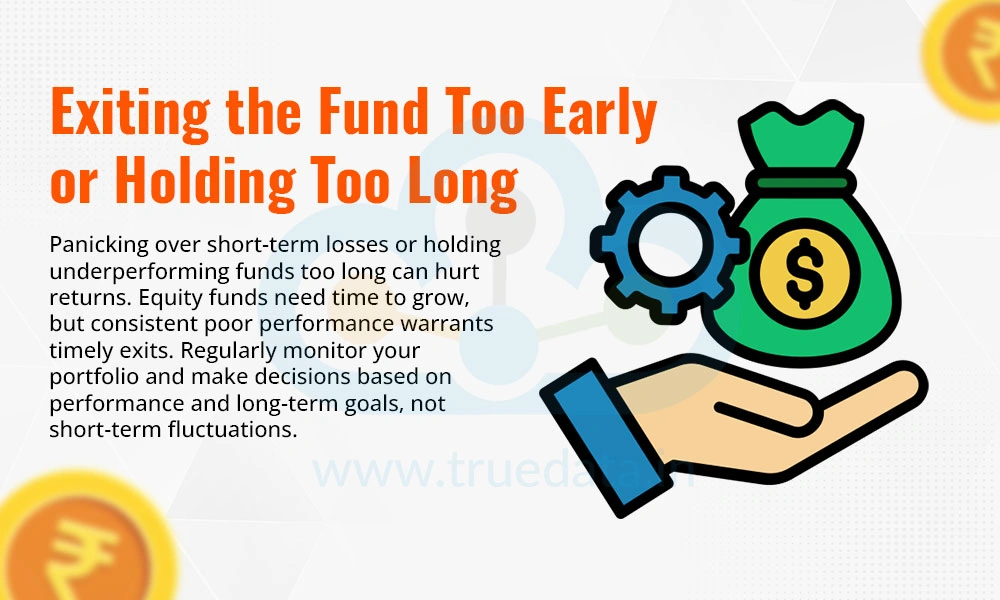
Some investors, especially beginners, panic when they see short-term losses and exit the mutual fund prematurely. On the other hand, some hold on to underperforming funds for too long, hoping the situation will improve. Both approaches can lead to poor financial outcomes. It is important to give equity-based mutual funds time to grow, as they are meant for long-term investing, however, investors should also cut their losses in a timely manner if the fund is consistently not meeting their expectations and yielding poor returns or losses. Thus, regular monitoring of the portfolio and making decisions based on performance and goals is a better strategy than acting on short-term fluctuations.

Many investors make the mistake of either over-monitoring their mutual fund investments or not checking them at all. While it is unnecessary to track daily movements, it is important to review the fund’s performance periodically. This helps ensure the fund is still aligned with financial goals and is performing as expected. If a fund consistently underperforms its benchmark or category for an extended period, it may be time to consider switching to a better option in the same category or exploring new ones.

Many investors rely on advice from friends, family, or online forums to choose mutual funds. While it is natural to seek opinions, investing based on tips or rumours can lead to poor decisions. Each investor has unique financial goals, risk tolerance, and timelines, so a fund that works for someone else might not be the best choice. Therefore, rather than following trends or hearsay, investors should do their own research and consult with financial advisors to make informed decisions.

One of the fundamental principles of investing is to ensure there is an emergency fund or contingency savings in place before locking money in long-term investments. Some investors make the mistake of putting all their available funds into mutual funds, leaving nothing for emergencies. In such cases, to meet any sudden financial needs investors may have to sell their investments at a loss or exit them prematurely. A proper contingency fund, covering at least 3-6 months of living expenses, ensures that mutual fund investments can remain undisturbed even during unexpected financial crises.
Investing in mutual funds is a great way for individuals to grow their wealth, however, it is important to approach it with knowledge and caution as many common mistakes can hinder the potential of mutual fund investments. Being aware of the various pitfalls and taking a more disciplined approach is the key to having a successful mutual fund portfolio that is capable of meeting all the financial goals and wealth creation in the long term.
This blog sheds light on the top mistakes often made by investors either knowingly or unknowingly that can damage a mutual fund portfolio. Are you too making some of these mistakes and did this article help you in correcting the course? Let us know your thoughts and reach out to us if you have any queries on this topic.
Till then Happy Reading!
Read More: Investing in Mutual Funds vs Fixed Deposits - Which is best?

Introduction For the longest time, investment in stock markets was thought to b...
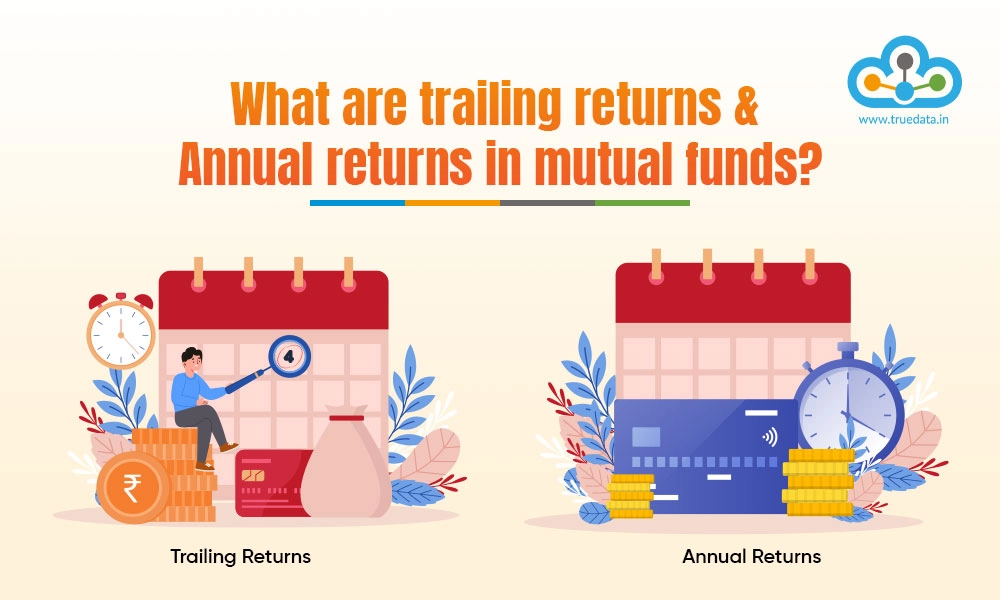
One of the primary points of comparison while picking between two or more invest...

It is a very well-known fact that mutual funds are considered to be among the st...